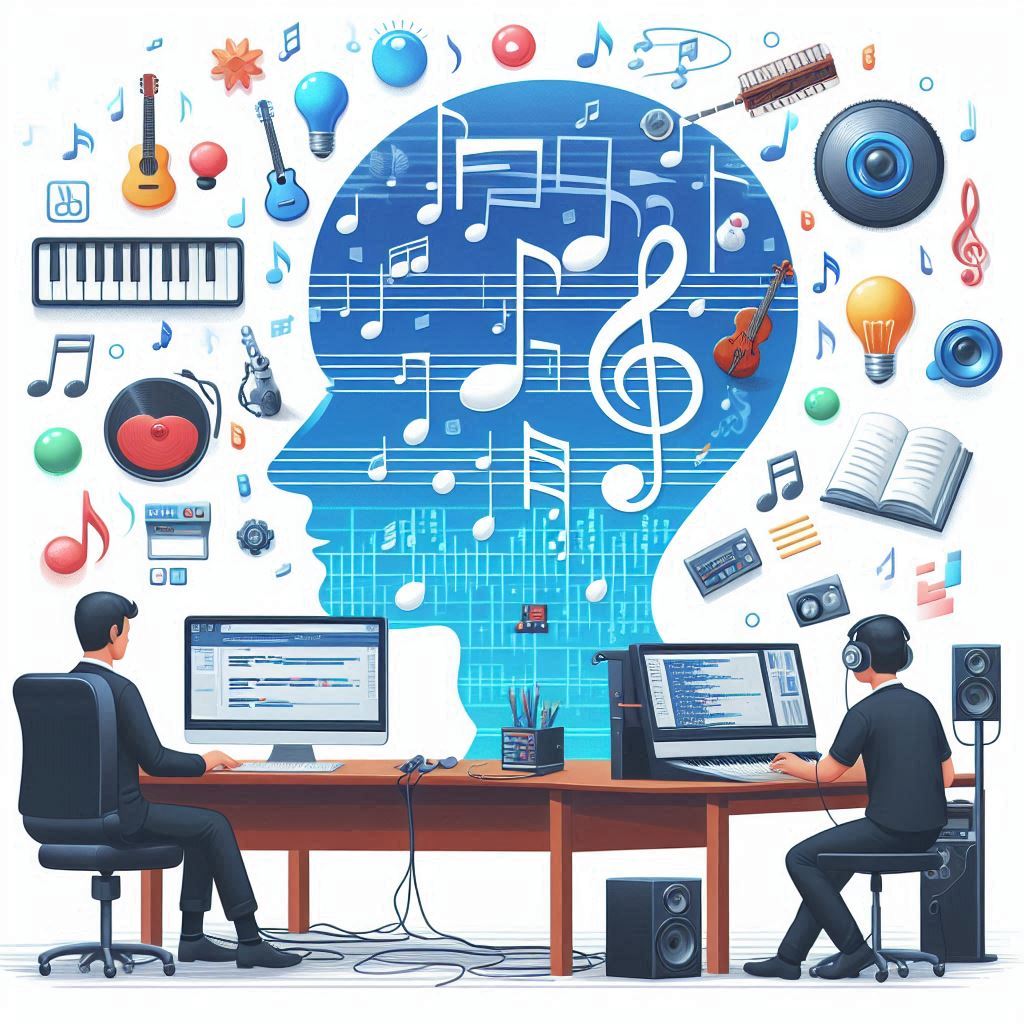Introduction
The intersection of music and coding might seem unexpected at first glance, but numerous studies have shown a strong correlation between music training and enhanced coding skills. Both disciplines require a unique blend of creativity, problem-solving, and technical prowess. This article explores how music training can positively influence coding abilities, delving into various cognitive and practical benefits.
Understanding Music Training
Music training encompasses learning to play an instrument, understanding music theory, and developing listening skills. This multifaceted approach not only enhances musical ability but also provides significant cognitive benefits. Learning music improves memory, concentration, and spatial-temporal skills, which are crucial for both musicians and coders.
Understanding Coding Skills
Coding involves writing instructions for computers using various programming languages. Fundamental coding skills include logical thinking, problem-solving, and attention to detail. Successful coders must also possess strong memory retention and the ability to recognize complex patterns, making the cognitive skills honed through music training highly relevant.
The Science Behind Music and Cognitive Development
Research has shown that music training enhances brain development, particularly in areas related to language, memory, and spatial reasoning. Studies indicate that musicians often have more significant gray matter volume in regions associated with auditory processing and executive function, suggesting that music training can lead to improved cognitive abilities that benefit coding.
Pattern Recognition
Role in Music
Music is inherently about recognizing patterns, whether in rhythm, melody, or harmony. Musicians develop an acute ability to detect and predict these patterns, which is a skill directly transferable to coding.
Role in Coding
Coding also relies heavily on pattern recognition. Identifying recurring structures in code and understanding the logic behind them is essential for debugging and creating efficient programs.
Similarities in Pattern Recognition
The skills used to recognize musical patterns help coders to see the underlying structure of code, making it easier to understand and manipulate complex algorithms.
Memory and Retention
Music Training and Memory Improvement
Musicians often memorize large pieces of music, which enhances their memory capabilities. This improvement extends beyond musical memory to general cognitive memory, benefiting tasks like coding.
Memory Techniques in Coding
Coders need to remember syntax rules, algorithms, and coding conventions. The enhanced memory skills developed through music training can significantly aid in retaining this information.
Concentration and Focus
How Music Training Enhances Focus
Practicing an instrument requires intense concentration and focus, skills that are equally important in coding. Musicians often train for hours, honing their ability to concentrate deeply on their tasks.
Importance of Concentration in Coding
Coding requires sustained attention to detail and the ability to work through complex problems without losing focus. The ability to concentrate for long periods is a valuable asset for any coder.
Problem-Solving Skills
How Music Fosters Creative Problem-Solving
Music composition and improvisation involve creative problem-solving. Musicians must find ways to express ideas within the constraints of musical theory and instrument capabilities.
Problem-Solving in Coding
Similarly, coding is about solving problems using logical and creative approaches. The problem-solving skills developed through music training can help coders think outside the box and come up with innovative solutions.
Discipline and Practice
The Discipline of Music Practice
Learning an instrument requires regular practice and discipline. Musicians must be diligent and patient, skills that are transferable to coding.
Parallels in Coding Practice
Coding also requires consistent practice and a disciplined approach to learning new technologies and solving problems. The perseverance developed through music training can help coders stay committed to their work.
Spatial-Temporal Skills
Music and Spatial-Temporal Reasoning
Playing music enhances spatial-temporal skills, which involve understanding the relationships between objects in space and time. These skills are crucial for tasks such as sight-reading music and playing complex pieces.
Application in Coding
Spatial-temporal reasoning is also important in coding, particularly in understanding algorithms and data structures. Coders who can think spatially can visualize problems and solutions more effectively.
Creativity and Innovation
Creativity in Music Composition
Music is a highly creative field, requiring musicians to compose, interpret, and improvise. This creativity can enhance a coder’s ability to think of novel solutions and approaches to problems.
Innovative Thinking in Coding
Innovation is at the heart of coding. The ability to approach problems creatively and come up with unique solutions is a valuable skill for any coder, and music training helps foster this kind of thinking.
Mathematical Skills
Math in Music Theory
Music theory involves a significant amount of mathematics, from understanding rhythms and scales to complex harmonic analysis. Musicians develop strong mathematical skills through their training.
Mathematical Logic in Coding
Coding is fundamentally mathematical. Understanding algorithms, data structures, and computational theory requires strong mathematical reasoning. The mathematical skills honed through music can greatly benefit coders.
Teamwork and Collaboration
Group Music Activities
Playing in ensembles and orchestras teaches musicians how to work effectively as a team, listen to others, and synchronize their efforts.
Collaboration in Coding Projects
Collaboration is crucial in coding, especially in large projects where teamwork is essential. The collaborative skills developed in music can help coders work better in teams, communicate effectively, and share ideas.
Stress Relief and Mental Well-being
Music as a Stress Reliever
Playing and listening to music is a well-known stress reliever. It can help musicians relax and maintain their mental well-being.
Maintaining Mental Health While Coding
Coding can be stressful, and maintaining mental health is important for productivity. Music can provide a valuable outlet for stress relief, helping coders stay calm and focused.
Empathy and Emotional Intelligence
Emotional Expression Through Music
Music is a powerful medium for expressing emotions. Musicians develop a deep sense of empathy and emotional intelligence through their art.
Emotional Intelligence in Coding Teams
Emotional intelligence is important in coding teams for effective communication and conflict resolution. The empathy developed through music can help coders understand and work better with their colleagues.
Learning New Languages
Musical Ear Training
Musicians train their ears to recognize pitches, rhythms, and harmonies, which enhances their ability to learn new sounds and patterns.
Syntax Learning in Programming Languages
Learning a new programming language requires recognizing and understanding new syntax and structures. The ear training from music can make learning new coding languages easier.
Adaptability and Flexibility
Adapting to New Music Styles
Musicians often adapt to different styles and genres of music, developing flexibility in their approach.
Adapting to New Coding Technologies
The tech field is constantly evolving, and coders must adapt to new languages, tools, and methodologies. The adaptability developed through music can help coders stay current and versatile.
Confidence and Performance
Building Confidence Through Music
Performing music in front of an audience builds confidence and stage presence. This experience helps musicians become more self-assured.
Presenting Coding Projects Confidently
Presenting coding projects to peers, clients, or stakeholders requires confidence. The performance skills developed through music can help coders present their work more effectively.
Case Studies and Real-Life Examples
Successful Coders with Music Backgrounds
Many successful coders have a background in music. Examples include notable figures in tech who credit their musical training for their success in coding.
Empirical Evidence of Benefits
Research and case studies provide empirical evidence supporting the cognitive and practical benefits of music training for coders.
Practical Tips for Integrating Music Training into Coding
Starting Music Lessons
For coders interested in reaping the benefits of music training, starting music lessons is a great first step. Choose an instrument you enjoy and find a qualified teacher.
Practical Exercises for Coders
Integrate musical exercises into your daily routine. Practice scales and rhythms to enhance pattern recognition, and engage in regular music practice to improve concentration and discipline.
Conclusion
Music training offers a myriad of cognitive and practical benefits that can significantly enhance coding skills. From improved pattern recognition and memory to enhanced problem-solving abilities and creativity, the skills developed through music training are highly transferable to coding. By integrating music into their routine, coders can boost their cognitive abilities, improve their work performance, and enjoy a more fulfilling and balanced life.
FAQs
How does music training improve coding skills? Music training enhances cognitive abilities such as pattern recognition, memory, and problem-solving, which are crucial for coding.
Can learning an instrument really help me become a better coder? Yes, learning an instrument can improve concentration, discipline, and spatial-temporal reasoning, all of which are valuable for coding.
Is there scientific evidence supporting the link between music training and coding skills? Numerous studies have shown that music training enhances cognitive functions that are beneficial for coding.
Do I need to be a professional musician to benefit from music training? No, even basic music training can provide significant cognitive benefits that enhance coding skills.
How can I start integrating music training into my coding routine? Start with simple music lessons and practice regularly. Incorporate musical exercises that enhance pattern recognition and memory.
Can music help reduce stress while coding? Yes, playing or listening to music can be an effective stress reliever, helping coders maintain their mental well-being.



